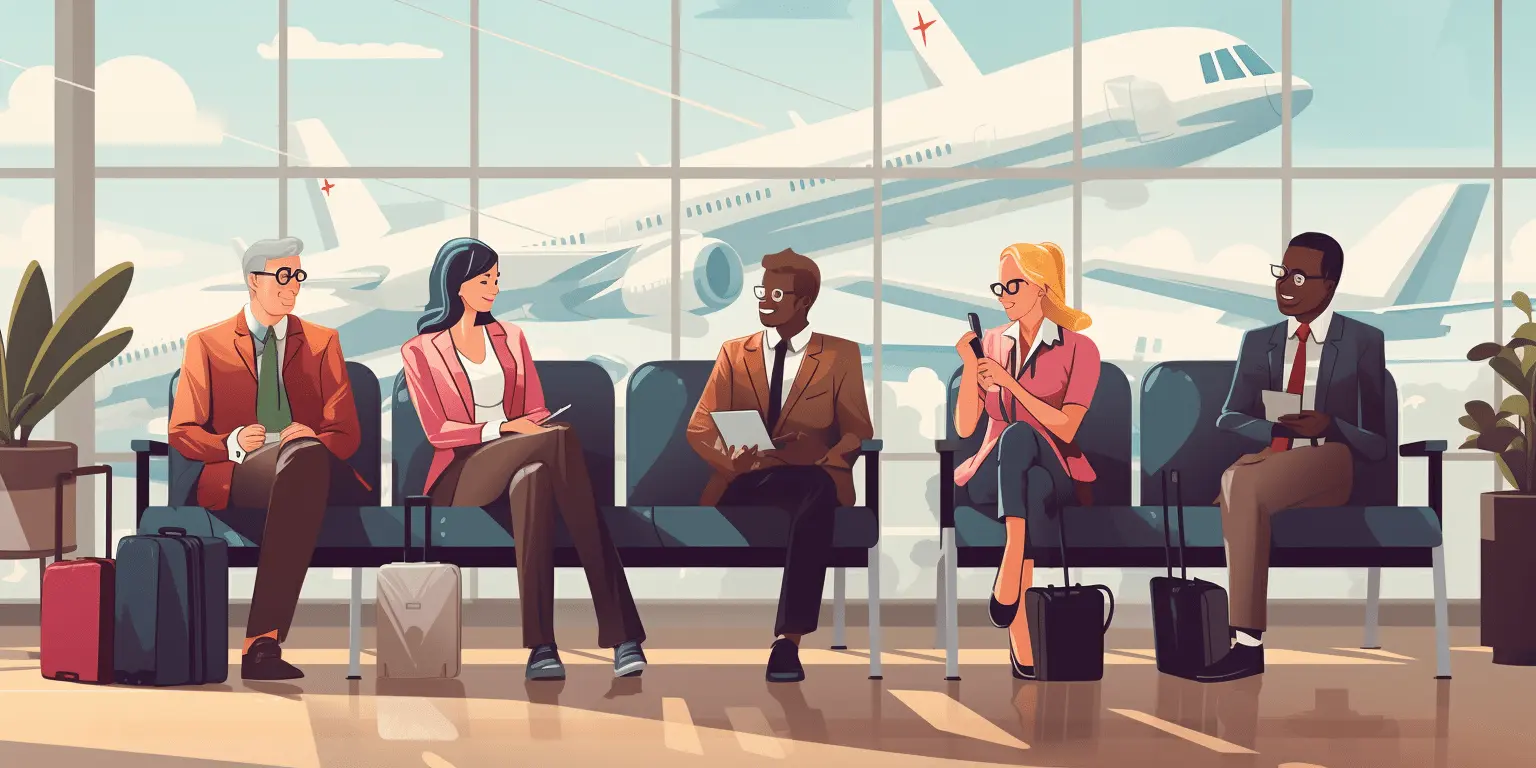Hack the Expedia Behavioral Interview: How to Convince Recruiters You Are The Best Match
Boost your interview skills via Interview.Study for Expedia's behavioral assessment. Learn sought-after competencies through examples and strategies emphasizing problem-solving and leadership.
Start your interview prep ~ its free!

Expedia
Practice 715 verified interview questions asked at Expedia in the last year.
Sections
Introduction
Are you gearing up for an interview at Expedia and feeling nervous about the behavioral interview? You're not alone. The Expedia Behavioral Interview is a crucial step in the recruitment process, designed to assess your problem-solving and teamwork skills. But don't worry, with the right Interview Success Strategies, you can ace this interview and convince recruiters that you are the best match for the company. In this blog post, we will explore key strategies for success in the Expedia Behavioral Interview, so you can confidently showcase your skills and stand out from the competition.
Understanding the Expedia Behavioral Interview: What to Expect?
The Expedia Behavioral Interview is an important step in the recruitment process, designed to assess your problem-solving and teamwork skills. During this interview, you can expect to be asked a series of behavioral questions that will require you to provide specific examples from your past experiences. The goal is to gauge how you have handled certain situations in the past, as this will give the interviewer insight into how you might handle similar situations in the future.
The interviewers at Expedia will use various behavioral question techniques to evaluate your abilities. They may use the STAR method, which stands for Situation, Task, Action, and Result. This method requires you to provide a detailed explanation of a specific situation or problem you faced, the task or goal you were trying to achieve, the action you took to resolve the situation, and the result or outcome of your actions.
Some common themes that may be covered in the behavioral interview include customer service scenarios, teamwork and collaboration, conflict resolution skills, leadership examples in the tech industry, adapting to change, problem-solving abilities, and more. It's important to come prepared with specific examples and stories that demonstrate your skills and experiences in these areas.
Another important aspect of the Expedia Behavioral Interview is understanding and aligning with the company's corporate culture. Expedia values employees who are committed to personal growth, can navigate the challenges of the travel industry, have effective communication skills, excel in time management, and demonstrate resilience. Additionally, showing that you are a cultural fit and have a passion for innovation and creativity will help you stand out during the interview.
Preparing for Your Expedia Interview: Key Skills and Competencies
Preparing for your Expedia interview requires you to identify and highlight key skills and competencies that align with the company's values and culture. This is your opportunity to showcase your personal growth stories, demonstrate your understanding of the challenges in the travel industry, and exhibit your time management skills in handling projects.
To effectively prepare for your interview, start by reflecting on your career motivation and goals. What drives you to succeed? What are you passionate about in the tech industry? Having a clear understanding of your career aspirations will not only help you answer questions about your long-term goals, but it will also show your commitment to personal growth.
Another important aspect to consider is your ability to navigate the challenges of the travel industry. Research the latest trends and developments in the industry and be prepared to discuss how you can contribute to Expedia's success in this competitive market. Highlight any experiences or insights you have that demonstrate your understanding of the unique challenges faced by the travel industry.
Effective time management is crucial in any role at Expedia. Be prepared to provide examples of projects or tasks where you had to prioritize and manage your time effectively to meet deadlines. Discuss your decision-making processes and how you approach complex problems, showcasing your problem-solving skills and your ability to handle multiple tasks simultaneously.
Expedia values employees who are a cultural fit and possess emotional intelligence. Consider how your values align with Expedia's corporate culture and be ready to discuss your ability to work well in diverse teams, communicate effectively, and demonstrate resilience in the face of challenges.
In addition to showcasing your successes, don't shy away from discussing your failures. Highlighting how you have learned from past mistakes and grown from them demonstrates your self-awareness and ability to adapt and improve.
Displaying Your Problem-Solving Skills in the Behavioral Interview
When it comes to the Expedia Behavioral Interview, one of the key skills you need to demonstrate is problem-solving. The interviewers want to see how you approach and tackle challenges, as this is crucial for success in any role at Expedia. Here are some strategies for effectively showcasing your problem-solving skills during the interview:
1. Be prepared with specific examples: Before the interview, think about situations in your past experiences where you have successfully solved a problem. These examples can come from your previous work, academic projects, or even personal experiences. Be ready to provide details about the problem, the steps you took to solve it, and the outcome of your actions.
2. Use the STAR method: The STAR method (Situation, Task, Action, Result) is a great framework for structuring your answers. Start by describing the situation or problem you faced, then explain the task or goal you were trying to achieve. Next, discuss the specific actions you took to address the problem, and finally, highlight the positive result or outcome of your efforts. This method will help you provide a clear and concise response while highlighting your problem-solving abilities.
3. Highlight your analytical thinking: Problem-solving often involves analytical thinking and the ability to break down complex problems into manageable parts. During the interview, explain how you analyze and evaluate information to identify the root cause of a problem. Discuss any methodologies or frameworks you use to approach problem-solving, such as root cause analysis, SWOT analysis, or brainstorming techniques.
4. Show adaptability and flexibility: Problem-solving often requires adaptability and the ability to think on your feet. Be prepared to discuss situations where you had to quickly adapt to unexpected challenges or changes in circumstances. Highlight how you remained calm under pressure and found creative solutions to overcome obstacles.
5. Emphasize collaboration: Problem-solving is rarely done in isolation. Showcase your teamwork and collaboration skills by explaining how you have worked with others to solve problems. Discuss instances where you actively sought input from colleagues, listened to different perspectives, and collaborated to find the best solution. This will demonstrate that you are not only a strong problem solver but also a valuable team player.
Showcasing Your Teamwork Ability during Your Interview
When it comes to the Expedia Behavioral Interview, it's important to remember that teamwork is a key competency they are looking for. The interviewers want to assess your ability to collaborate effectively with others and work towards a common goal. Here are some tips on how to showcase your teamwork ability during your interview and convince recruiters that you are a strong team player:
1. Highlight past experiences: Think about previous projects or situations where you worked in a team and achieved successful outcomes. Be prepared to discuss the role you played, the challenges you faced, and the collaborative strategies you employed to overcome those challenges. Emphasize how your teamwork skills contributed to the overall success of the team.
2. Demonstrate effective communication: Strong communication skills are essential for effective teamwork. During the interview, discuss how you actively listen to others, express your ideas clearly and concisely, and provide constructive feedback to your team members. Highlight instances where you were able to communicate effectively to resolve conflicts or misunderstandings within the team.
3. Showcase your ability to adapt and be flexible: Teamwork often requires flexibility and the ability to adapt to different working styles and personalities. Share examples of how you have adjusted your approach to fit the needs of the team and how you have contributed to a positive team dynamic. Discuss instances where you took on additional responsibilities or stepped up to support team members during challenging times.
4. Discuss your problem-solving skills within a team setting: Problem-solving is an essential component of teamwork. Describe situations where you worked collaboratively to identify and address obstacles or challenges. Talk about how you contributed your ideas, listened to the perspectives of others, and worked together to find creative solutions. Highlight how your problem-solving skills have positively impacted the team's performance.
5. Emphasize your ability to build relationships: Building strong relationships with your teammates is crucial for effective teamwork. Discuss how you establish trust and rapport within a team, foster a positive and inclusive environment, and encourage collaboration and cooperation. Showcasing your ability to build and maintain relationships with diverse team members will demonstrate your value as a team player.
Overcoming Interview Anxiety: Techniques to Improve Confidence
Feeling anxious before an interview is completely normal, especially when it comes to the Expedia Behavioral Interview. But don't worry, there are techniques you can use to improve your confidence and overcome interview anxiety. Here are some tried and tested techniques to help you feel more at ease and perform your best during the Expedia Behavioral Interview:
1. Prepare thoroughly: One of the best ways to combat interview anxiety is to be well-prepared. Research the company, familiarize yourself with the job description, and practice answering common behavioral interview questions. The more prepared you are, the more confident you will feel going into the interview.
2. Visualize success: Take a few moments before the interview to visualize yourself acing the interview and impressing the interviewers. Imagine yourself confidently answering questions and showcasing your skills and experiences. This positive visualization can help calm your nerves and boost your confidence.
3. Practice deep breathing exercises: Deep breathing exercises can help calm your nerves and reduce anxiety. Before the interview, take a few deep breaths, inhaling through your nose and exhaling slowly through your mouth. This simple technique can help relax your body and mind, allowing you to approach the interview with a clear and focused mindset.
4. Focus on positive self-talk: Negative thoughts and self-doubt can undermine your confidence. Replace negative thoughts with positive affirmations and reminders of your skills and qualifications. Tell yourself that you are prepared, capable, and deserving of the opportunity. Positive self-talk can help build your confidence and shift your mindset from self-doubt to self-assurance.
5. Remember past successes: Take a moment to reflect on past accomplishments and successes in your career. Remind yourself of the challenges you have overcome and the achievements you have made. This reflection can help boost your confidence and remind you that you have what it takes to succeed in the interview.
6. Practice, practice, practice: The more you practice, the more comfortable and confident you will feel during the interview. Enlist the help of a friend or family member to conduct mock interviews and provide feedback. Practice answering behavioral questions and work on articulating your experiences and skills. The more you practice, the more confident you will become.
Case Studies and Examples of Successful Expedia Interviews
Throughout the years, there have been numerous successful candidates who have aced the Expedia Behavioral Interview and landed their dream job. Let's take a look at a few case studies and examples of these interviews to give you a better understanding of what it takes to succeed.
Case Study 1: Sarah, a customer service expert
Sarah had extensive experience in the customer service industry and was able to showcase her skills during the Expedia Behavioral Interview. When asked about a challenging customer service scenario, Sarah shared a specific example where she had to handle a difficult customer who was unsatisfied with their hotel booking. She explained the situation using the STAR method, describing the problem, her task of resolving the issue, the actions she took to appease the customer, and the positive result of retaining the customer's trust and satisfaction. Sarah's ability to navigate customer service challenges impressed the interviewers, highlighting her problem-solving and communication skills.
Case Study 2: Michael, a tech leader
Michael had a strong background in the tech industry and was able to showcase his leadership skills during the Expedia Behavioral Interview. When asked about a situation where he demonstrated leadership in the tech industry, Michael shared a specific example of a project where he had to lead a team of developers to meet a tight deadline. He described the challenges the team faced, his task of coordinating their efforts, the actions he took to streamline the workflow, and the positive result of successfully completing the project on time. Michael's ability to lead and collaborate with his team demonstrated his problem-solving, communication, and time management skills, making him an ideal candidate for Expedia.
Case Study 3: Emily, an adaptable problem solver
Emily had a diverse background and showcased her adaptability and problem-solving skills during the Expedia Behavioral Interview. When asked about a situation where she had to adapt to change, Emily shared a specific example of a project where the requirements changed midway. She described how she quickly adjusted her approach, collaborated with her team to brainstorm solutions, and successfully delivered the project within the revised scope. Emily's ability to adapt, think on her feet, and work collaboratively demonstrated her problem-solving, flexibility, and teamwork skills, making her a strong fit for Expedia.
Tips for Following Up after the Interview
Once you've completed the Expedia Behavioral Interview, it's important to follow up and leave a lasting impression on the recruiters. Here are some tips to help you navigate the post-interview process and increase your chances of landing the job:
1. Send a personalized thank-you note: Within 24 hours of your interview, send a thank-you note to the interviewer(s) expressing your appreciation for the opportunity to interview with Expedia. Personalize the note by mentioning specific points of discussion or insights gained during the interview. This gesture shows your professionalism and gratitude.
2. Follow up on any action items: During the interview, if the interviewer mentioned any specific tasks or follow-up items, make sure to fulfill them promptly. Whether it's sending additional documents or references, completing an assessment, or providing any additional information, demonstrate your attention to detail and commitment to the process.
3. Keep the conversation going: If you haven't heard back from the interviewer within the expected time frame, don't hesitate to reach out for an update. Send a polite follow-up email inquiring about the status of your application and expressing your continued interest in the role. This demonstrates your enthusiasm and proactive approach.
4. Network with Expedia employees: Utilize your network and connections to get in touch with current or former Expedia employees. They can provide valuable insights about the company culture, hiring process, and potential openings. Networking with Expedia employees shows your genuine interest in the company and can give you an advantage in the hiring process.
5. Stay positive and professional: While waiting for a response, maintain a positive attitude and refrain from reaching out too frequently. It's important to be patient and allow the recruiters ample time to review your application and make a decision. Remember to maintain a professional demeanor throughout the process, as your interactions with Expedia representatives can influence their perception of you.
Recommended Posts
Questions
Job Search Tools



